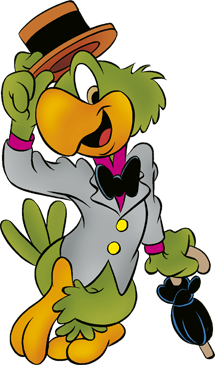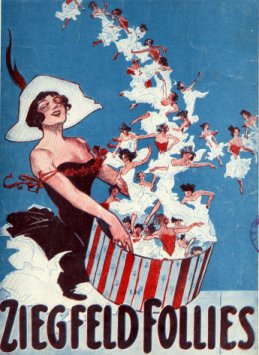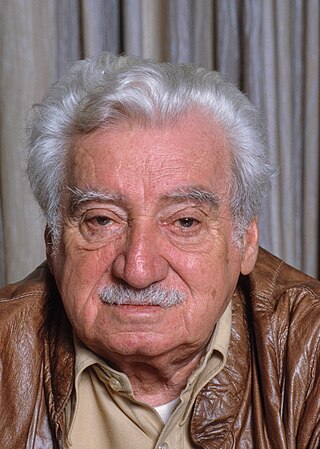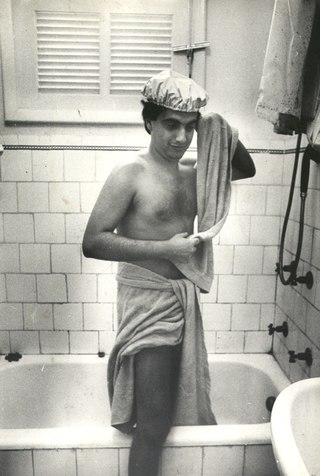
Maria do Carmo Miranda da Cunha, known professionally as Carmen Miranda, was a Portuguese-born Brazilian singer, dancer, and actress. Nicknamed "The Brazilian Bombshell", she was known for her signature fruit hat outfit that she wore in her American films.

José "Zé" Carioca is a cartoon anthropomorphic parrot created by the Brazilian cartoonist José Carlos de Brito and shown to Walt Disney on his trip to Rio de Janeiro in 1941. The Walt Disney Company then incorporated the idea, being introduced in the 1942 film Saludos Amigos as a friend of Donald Duck, described by Time as "a dapper Brazilian parrot, who is as superior to Donald Duck as the Duck was to Mickey Mouse." He speaks Portuguese with a Brazilian accent. He returned in the 1944 film The Three Caballeros along with Donald and a Mexican rooster named Panchito Pistoles. José is from Rio de Janeiro, Brazil.

Saludos Amigos is a 1942 American live-action/animated propaganda anthology film produced by Walt Disney and released by RKO Radio Pictures. Set in Latin America, it is made up of four different segments; Donald Duck stars in two of them and Goofy stars in one. It also features the first appearance of José Carioca, the malandro Brazilian parrot. Saludos Amigos premiered in Rio de Janeiro on August 24, 1942. It was released in the United States on February 6, 1943.

The Three Caballeros is a 1944 American live-action and animated musical propaganda anthology film produced by Walt Disney and released by RKO Radio Pictures. The film premiered in Mexico City on December 21, 1944. It was released in the United States on February 3, 1945 and in the United Kingdom in March 1945. It marks the tenth anniversary of Donald Duck and plots an adventure through parts of Latin America, combining live-action and animation. This is the second of the six package films released by Walt Disney Productions in the 1940s, following Saludos Amigos (1942). It is also notable for being one of the first feature-length films to incorporate traditional animation with live-action actors.
Brazil is the largest country in both South America and Latin America.

The Ziegfeld Follies were a series of elaborate theatrical revue productions on Broadway in New York City from 1907 to 1931, with renewals in 1934, 1936, 1943, and 1957. They became a radio program in 1932 and 1936 as The Ziegfeld Follies of the Air.

Jorge Amado was a Brazilian writer of the modernist school. He remains the best-known of modern Brazilian writers, with his work having been translated into some 49 languages and popularized in film, including Dona Flor and Her Two Husbands in 1976. His work reflects the image of a Mestiço Brazil and is marked by religious syncretism. He depicted a cheerful and optimistic country that was beset, at the same time, with deep social and economic differences.
Leo is the Latin word for lion. It most often refers to:

Henrique de Souza Filho, commonly known as Henfil, was a Brazilian cartoonist, caricaturist, journalist and writer, born in Ribeirão das Neves, Minas Gerais.

Ary Evangelista de Resende Barroso was a Brazilian composer, pianist, soccer commentator, and talent-show host on radio and TV. He was one of Brazil's most successful songwriters in the first half of the 20th century. Barroso also composed many songs for Carmen Miranda during her career.

Alberto de Almeida Cavalcanti was a Brazilian-born film director and producer. He was often credited under the single name "Cavalcanti".

Federico Arturo Guízar Tolentino, known professionally as Tito Guízar, was a Mexican singer and actor. Along with Dolores del Río, Ramón Novarro and Lupe Vélez, as well as José Mojica, Guízar was among the few Mexicans who made history in the early years of Hollywood.
"Tico-Tico no fubá" is a Brazilian choro song written by Zequinha de Abreu in 1917. Its original title was "Tico-Tico no farelo", but since Brazilian guitarist Américo Jacomino "Canhoto" (1889–1928) had a work with the same title, Abreu's work was given its present name in 1931, and sometime afterward Aloysio de Oliveira wrote the original Portuguese lyrics.

Broadway Rhythm (1944) is a Metro-Goldwyn-Mayer Technicolor musical film. It was produced by Jack Cummings and directed by Roy Del Ruth.

Heleno de Freitas was a Brazilian footballer who played as a forward.
Grupo Globo, formerly and still legally known as Organizações Globo, is a Brazilian private entertainment and mass media conglomerate based in Rio de Janeiro, Brazil. Founded in 1925 by Irineu Marinho, it is the largest media group in Latin America, and one of the world's largest media conglomerates.

Brewster's Millions is a 1945 American comedy film directed by Allan Dwan and starring Dennis O'Keefe, Helen Walker and June Havoc. It is one of many film adaptations of the 1902 novel of the same name by George Barr McCutcheon and the subsequent smash-hit play adaptation by Byron Ongley and Winchell Smith. In the novel, Brewster is a stockbroker; in this version, he is portrayed as a returning soldier.

Brazil is a 1944 American musical comedy film directed by Joseph Santley and starring Tito Guízar, Virginia Bruce and Edward Everett Horton.

Events in the year 1944 in Brazil.

Solano Trindade was a Brazilian poet, actor, folklorist, painter, stage director and activist. Trindade was active in the Brazilian Black Movement, having founded or co-founded several popular theater and art initiatives, such as the Teatro Popular Brasileiro company.

















